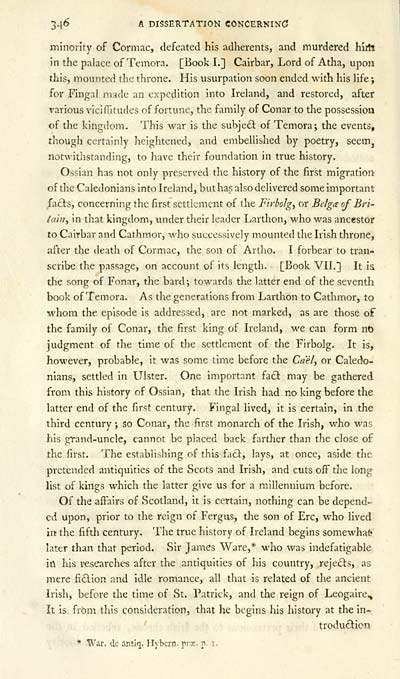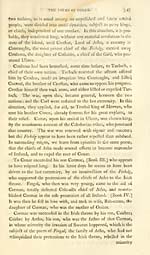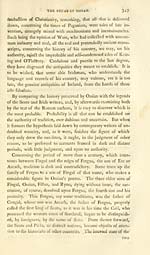Download files
Complete book:
Individual page:
Thumbnail gallery: Grid view | List view

34*^ A DISSERTATION CONCERNING
minority of Cormac, defeated his adherents, and murdered hirti
in the palace of Temora. [Book I.] Cairbar, Lord of Atlia, upon
this, mounted the throne. His usurpation soon ended with his life ;
for Fingal made an expedition into Ireland, and restored, after
various vicifTitudes of fortune, the family of Conar to the possession
of the kingdom. This war is the subjed of Temora; the events,
though certainly heightened, and embellished by poetry, seem,
notwithstanding, to have their foundation in true history.
Ossian has not only preserved the history of the first migration
of the Caledonians into Ireland, but has also delivered some important
facts, concerning the first settlement of the Firbclg^ or Belg(t of Bri-
tabiy in that kingdom, under their leader Larthon, who was ancestor
to Cairbar and Cathmor, who successively mounted the Irish throne,
after the death of Cormac, the son of Artho. I forbear to tran-
scribe the passage, on account of its length. [Book VII.] It is
the song of Fonar, the bard ; towards the latter end of the seventh
book of Temora. As the generations from Larthon to Cathmor, to
whom the episode is addressed, are not marked, as are those of
the family of Conar, the first king of Ireland, we can form no
judgment of the time of the settlement of the Firbolg. It is,
however, probable, it was some time before the Ca'el^ or Caledo-
nians, settled in Ulster. One important fa£t may be gathered
from this history of Ossian, that the Irish had no king before the
latter end of the first century. Fingal lived, it is certain, in the
third century, so Conar, the first monarch of the Irish, who was
his grand-uncle, cannot be placed back farther than the close of
the first. The establishing of this fadi, lays, at once, aside the
pretended antiquities of the Scots and Irish, and cuts off the long
list of kings which the latter give us for a millennium before.
Of tlae affairs of Scotland, it is certain, nothing can be depend-
ed upon, prior to the reign of Fergus, tlie son of Ere, who lived
in the fifth century. The true history of Ireland begins somewhat?
later than that period. Sir James Ware,* who was indefatigable
jrt his researches after the antiquities of his country, rejefts, as
mere ficlion and idle romance, all that is related of tlie ancient
Irish, before the time of St. Patrick, and the reign of Leogaire.^
It is from this consideration, that he begins his history at the in-
trodu£^io^
* War, dc Antiij. Hybcrn. fvx. p. i.
minority of Cormac, defeated his adherents, and murdered hirti
in the palace of Temora. [Book I.] Cairbar, Lord of Atlia, upon
this, mounted the throne. His usurpation soon ended with his life ;
for Fingal made an expedition into Ireland, and restored, after
various vicifTitudes of fortune, the family of Conar to the possession
of the kingdom. This war is the subjed of Temora; the events,
though certainly heightened, and embellished by poetry, seem,
notwithstanding, to have their foundation in true history.
Ossian has not only preserved the history of the first migration
of the Caledonians into Ireland, but has also delivered some important
facts, concerning the first settlement of the Firbclg^ or Belg(t of Bri-
tabiy in that kingdom, under their leader Larthon, who was ancestor
to Cairbar and Cathmor, who successively mounted the Irish throne,
after the death of Cormac, the son of Artho. I forbear to tran-
scribe the passage, on account of its length. [Book VII.] It is
the song of Fonar, the bard ; towards the latter end of the seventh
book of Temora. As the generations from Larthon to Cathmor, to
whom the episode is addressed, are not marked, as are those of
the family of Conar, the first king of Ireland, we can form no
judgment of the time of the settlement of the Firbolg. It is,
however, probable, it was some time before the Ca'el^ or Caledo-
nians, settled in Ulster. One important fa£t may be gathered
from this history of Ossian, that the Irish had no king before the
latter end of the first century. Fingal lived, it is certain, in the
third century, so Conar, the first monarch of the Irish, who was
his grand-uncle, cannot be placed back farther than the close of
the first. The establishing of this fadi, lays, at once, aside the
pretended antiquities of the Scots and Irish, and cuts off the long
list of kings which the latter give us for a millennium before.
Of tlae affairs of Scotland, it is certain, nothing can be depend-
ed upon, prior to the reign of Fergus, tlie son of Ere, who lived
in the fifth century. The true history of Ireland begins somewhat?
later than that period. Sir James Ware,* who was indefatigable
jrt his researches after the antiquities of his country, rejefts, as
mere ficlion and idle romance, all that is related of tlie ancient
Irish, before the time of St. Patrick, and the reign of Leogaire.^
It is from this consideration, that he begins his history at the in-
trodu£^io^
* War, dc Antiij. Hybcrn. fvx. p. i.
Set display mode to: Large image | Transcription
Images and transcriptions on this page, including medium image downloads, may be used under the Creative Commons Attribution 4.0 International Licence unless otherwise stated. ![]()
| Early Gaelic Book Collections > Ossian Collection > Poems of Ossian, the son of Fingal > (358) |
|---|
| Permanent URL | https://digital.nls.uk/77927688 |
|---|
| Description | Selected books from the Ossian Collection of 327 volumes, originally assembled by J. Norman Methven of Perth. Different editions and translations of James MacPherson's epic poem 'Ossian', some with a map of the 'Kingdom of Connor'. Also secondary material relating to Ossianic poetry and the Ossian controversy. |
|---|
| Description | Selected items from five 'Special and Named Printed Collections'. Includes books in Gaelic and other Celtic languages, works about the Gaels, their languages, literature, culture and history. |
|---|

